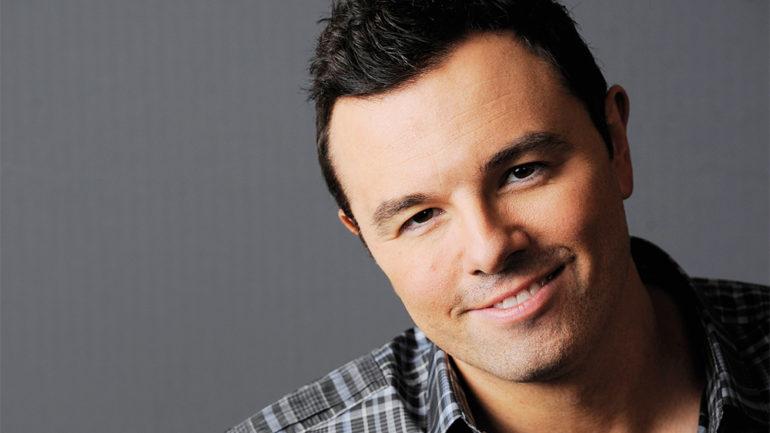How Seth MacFarlane Made an Empire Spanning TV, Film, Music
By Scott Huver
LOS ANGELES (Variety.com) – “The empire is accidental,” says Seth MacFarlane as he sits atop the sort of rarefied showbiz kingdom — television shows, movies, acting roles, musical albums, merchandise — that only a handful of entertainment industry titans such as George Lucas and Walt Disney have known.
MacFarlane, who is set to receive a star April 23 on the Hollywood Walk of Fame, says there was never a plan to build such a legacy, only to work on things that make him happy.
“I think you’ll be surprised by some of the ideas and the things that he’s excited about,” says Erica Huggins, the president of MacFarlane’s production company Fuzzy Door. She expects the company’s future to potentially include dramas, remakes, podcasts — plus content from other creators who excite her boss. “The best way to describe the kind of genius that Seth has is that he sees it in the full picture. It’s kind of a complete sensory way of approaching a piece of material. I’ve been around long enough to see other people work. I’ve never seen anything like this.”
MacFarlane acknowledges that if he has an interest in something, there have to be others who share his passion, and that instinct has served him well — from his early days at animation institution Hanna-Barbera, through the rocky years of “Family Guy” that ultimately spawned a long-running TV fiefdom (including “American Dad!” and “The Cleveland Show”), non-comedic efforts (“The Orville” and a “Cosmos” revival), onto feature films (the “Ted” movies, “A Million Ways to Die in the West”) and as an actor-for-hire (“Logan Lucky,” the forthcoming “The Loudest Voice”).
Along the way there have been awards-nominated albums of old standards, sold-out concerts, philanthropic causes and even a stint hosting the Academy Awards, all by age 45.
As each new form was gradually mastered, he says, “the challenge was gone, and so I wanted to move on to something else … a whole new set of muscles to learn how to use.”
But despite the breadth of his projects, he’s not a multitasking savant, he insists. “I generally tend to devote my personal efforts to one thing at a time. I’m not the kind of person who can slice up creative energy between eight different things. It’s just not how my brain works. Honestly, it’s not satisfying. Then you become more of an executive, and that’s not why I got into the business.”
What works best for him is setting up his projects with the right people to carry the torch forward with the freedom to succeed or fail on their own (as when he departed “Family Guy” or had his “American Dad co-creators primarily run that animated show), or incubate an idea he loves and let the creators operate autonomously (as on “Cosmos” and “Blunt Talk”).
“Look, is it the FDR method or the Hitler method?” he asks. “One of those people trusted his team and delegated and got the best work from everyone, and the other one micromanaged and eventually killed himself in a bunker, so which one do you want to be?”
“The best way to describe the kind of genius that Seth has is that he sees it in the full picture.”
Erica Huggins
MacFarlane’s strategy is to put someone in charge of a show and, “if that person is truly in charge,” not “force any creative decisions on them from afar.” That’s how he feels he will get the best work out of his team, as well as achieve “everything without putting myself into an early grave.”
“He’s just is very committed to the highest level of quality, and I think you can see it across all of his work,” says Dana Walden, the former Fox chairman and co-CEO who presided over the rise of MacFarlane’s network real estate. “He’s a perfectionist.”
“Family Guy” executive producer Kara Vallow, who has worked with MacFarlane since his earliest days in animation, sees a common theme to his successes: “The projects that he was taking on never seemed to be out of desire for money or pomposity,” she says. “It all seems to me like different versions of innocence and the dedication that he had when I first worked with him when he was 23.”
“Cosmos” co-creator Ann Druyan says she was astounded at both how MacFarlane’s influence with the network and his esteem among fans brought the science series to an unexpectedly huge mainstream audience.
“That’s all because of Seth’s credibility as one of the great intelligences in television history,” she says. “One with a great brain and an eye for popular taste, but also for taking it a little further than is usually done.”
For now, MacFarlane’s plate is relatively full with “The Orville,” on which he serves myriad creative roles, including starring as the human captain of the ship Ed Mercer. He also has “Once in a While,” his fifth album, which dropped digitally April 19. But he can’t stop looking ahead to what’s next, including potentially penning a Broadway show, he says, and perhaps even reviving a classic television series he loves. Additionally, “a feature-length film musical is not off the table, and I believe there will be ‘Family Guy’ movie at some point,” he says. Regarding the latter, he already has the “specific idea … that will challenge me in new ways as well.”

